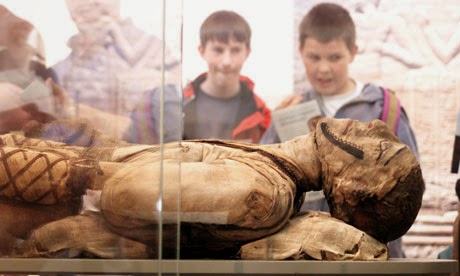Celeste Nelson
Imagine
if you were strolling through a museum that was full of ancient artifacts and ancestral
remains, when suddenly you come upon an exhibit of the preserved remains of
your great, great grandfather. How would you feel? I would feel pretty upset.
My grandfather’s remains deserve to be treated with respect. No one considered
the feelings of the descendants of the man. The fact that the museum is receiving
money for digging up someone’s grandfather and putting him on display is
morally wrong. This is how many Native Americans felt about their ancestors and
cultural objects being dug up and put on display for educational purposes.
In
a previous time, Native Americans could claim no ownership rights to artifacts
that were taken from their land. Their burial grounds were dug up by archeologists
and the findings were sent to museums across the country. Many artifacts were
purchased, often below the value of the objects, or stolen from tribes.
Finally,
a law was passed in nineteen ninety called the Native American Graves Protection
and Repatriation Act. It reserved the rights of Native American lineal descendants,
Indian tribes, and Native Hawaiian organizations with respect to the treatment,
repatriation, and disposition of Native American human remains, funerary
objects, sacred objects, and objects of cultural patrimony. The law also
mentions that’s the tribes can claim ownership of objects, and if a review
determines that their claim is justified, then the ownership of the artifact is
given. Unfortunately, it was not always so easy for tribes to claim their
cultural item.
Although there were many counts of museums
happily returning items back to the rightful tribes, there were also many
counts of museums not willing to be so compliant. The University of Pennsylvania’s museum of
Archeology and Anthropology had over forty items that the Tlingit people of Southeastern
Alaska tried to claim. The museum would
only give back eight items and allow the tribe to serve as a co-curator of the
rest of the objects. The tribe said that they would not hesitate to take the
museum to court if they did not come up with a better offer.
There
were people who thought that returning items back to a tribe was not the
answer. The late Clement W. Meighan, a professor of anthropology at the
University of California, was one of those people. She saw returning bones and
artifacts to the tribes so that they could rebury them as “The equivalent of a
historian burning documents after he has studied them, thus, repatriation is
merely an inconvenience that makes it impossible for scientists to carry out a genuinely
scientific study of American Indian prehistory. An entire field of academic
study may be put out of business.”
I
stand by the Native American Graves Protection and Repatriation Act. I think it
is morally wrong to go digging up someone’s ancestors so they can be put on
display. It is disrespectful to the Native Americans to treat their artifacts
and ancestors as a means of business. Many Native Americans will benefit from
this law and many artifacts and cultural items can be rightfully returned to
tribes across America.
 |
| Native American remains |
 |
| Excavators digging up burial grounds |
 |
| Native American remains on display |
 |
| Native American artifacts in a museum |
 |
| Burial grounds |
The official website stating the current repatriation laws
This website goes more indepth on the laws and the background of them
An article on the debate of the law
This article describes counts of the law being in use and the controversy
This article talks about the debate and why people are in favor or not of this law
This article does not talk explicitly on Native Americans but it talks about similar cases and how they will affect the people





